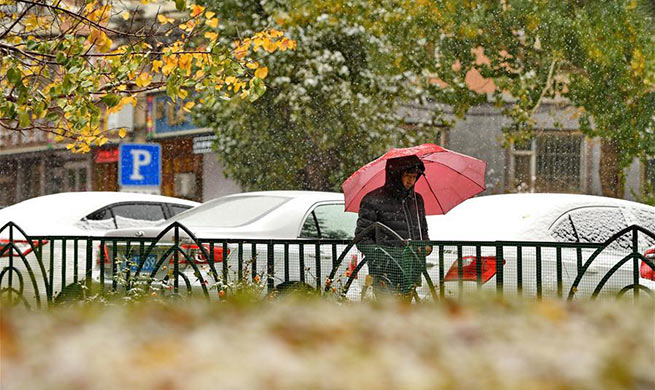LONDON, Oct. 29 (Xinhua) -- A surprise improvement in British economic conditions over the past six months was revealed on Monday, underpinned by continued economic growth, nearly-record employment and better tax receipts, allowing the government to spend more in the run-up to Brexit.
The independent official data body, the Office of Budget Responsibility (OBR), announced on late Monday afternoon that there had been "a significant improvement in the underlying pace of deficit reduction", and the government's improved performance at managing and reducing its deficit has allowed it to fund an increase in spending on the National Health Service.
The OBR's figures on economic performance and forecasts are used to plan the government's budget, which was announced by Chancellor of the Exchequer Philip Hammond earlier on Monday afternoon and are contained in its Economic and Fiscal Outlook published on Monday afternoon, forecasting the coming five years.
Despite the uncertainties of the Brexit process, which could see British businesses and the economy facing structural challenges and increased costs in the event of a Brexit from the European Union (EU) with no agreement on trade and tariffs, the economy has performed well over the past six months
Hammond was confident enough to make a flagship spending commitment to increase spending on the National Health Service (NHS) by 20 billion pounds (about 25.6 billion U.S. dollars) over the next five years.
Robert Chote, chairman of the OBR, said in a press briefing: "If the Chancellor had sat on his hands in the Budget, he would be on course to deliver a small surplus of 3.5 billion pounds by 2023-24.
"But the Chancellor... has delivered the largest discretionary fiscal giveaway since the creation of the OBR (in 2020)."
Chote added: "This means that while the deficit remains significantly lower than expected this year, there is very little improvement from March in the later years of the (budget) forecast.
"The windfall has been spent rather than saved."
Public finances have performed better so far this year than the OBR and outside forecasters expected in March, at the time of the last financial statement by Chancellor Hammond, even though the economy has grown less quickly than expected at the time.
The ONS has revised last year's budget deficit lower. Borrowing has also fallen more sharply in the first half of 2018-19 than anticipated, relative to the same period last year. As a result, borrowing is 11.9 billion pounds lower for the full year, reflecting stronger tax revenues and lower spending on welfare and debt interest than expected.
The performance of the real economy "has been less impressive relative to expectations", the OBR noted in the fiscal report.
It said as a result it had revised real GDP growth in 2018 down from 1.5 to 1.3 percent, however this has primarily been due to the temporary effects of bad weather in the first quarter of the year which reduced economic growth to near zero. There has since been a rebound in economic growth, as lost ground is recovered.
Economic growth was forecast by the OBR to pick up to 1.6 percent next year, up from 1.3 percent in March thanks to the budget measures.
However, the OBR noted that unemployment was at 4 percent, a low not seen for more than 40 years, yet inflationary wage pressures had not begun, and the institution now believes the economy can support more jobs without risking dangerous inflationary pressures.
The OBR now believed that the economy can support 4 percent unemployment without inflation, rather than the previous 4.5 percent and forecast the jobless figure to continue falling to 3.7 percent over the coming year, before rising again.
The resulting upward revision in OBR figures to cumulative GDP growth meant that the underlying improvement in the budget deficit rises from 11.9 billion pounds this year to 18.1 billion pounds by 2022-23, the OBR noted on the back of higher government revenues such as tax.
The key uncertainty for the OBR's forecast is Brexit.
It noted that a disorderly Brexit, one in which the EU and Britain parted without agreement would be of a "scale that would be very hard to predict, given the lack of precedent."
Chote said: "This forecast assumes a relatively smooth departure from the EU in March next year. A disorderly one could have severe short-term implications for the economy, the exchange rate, asset prices and the public finances." (1 pound = 1.28 U.S. dollars)












